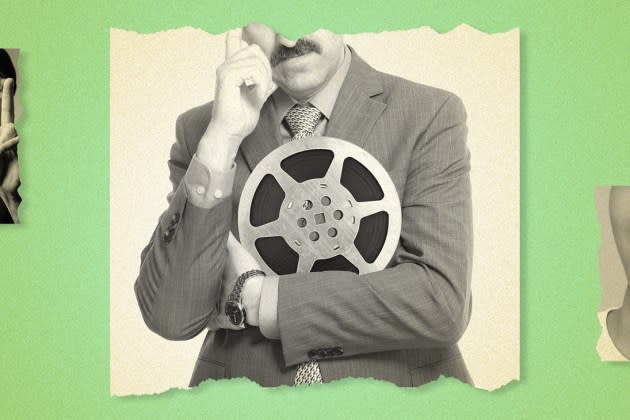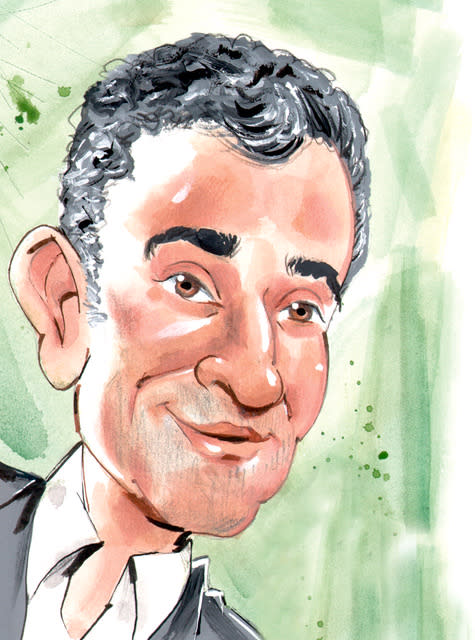“Dear Remy”: Hollywood Career Coach Gives Advice to a Conflicted Media Heir and a Shunned Star

I’m Being Canceled for Things My Character Did!
Dear Remy,
More from The Hollywood Reporter
"Dear Remy": Hollywood Career Coach Gives Advice on Met Gala Burn Out and Surviving Star Meltdowns
"Dear Remy": Hollywood Career Coach Gives Advice to a Grieving Actor and an Exec in Script Storm
"Dear Remy": Hollywood Career Coach Gives Advice to a Henpecked Star and a Reluctant Sitcom Actor
In the ’90s, I was flying high with a role in a multi-award-winning sitcom and graced the cover of every magazine. I was even considered for a Calvin Klein shoot opposite Kate Moss but was passed over for someone with more visible abs.
Fast forward to 2024, and I’m now a Hollywood pariah who would struggle to be seen by an extras agency.
“What terrible thing did I do for this 180 to have befallen me?” you ask. Here’s the kicker, Remy: absolutely nothing at all.
Instead, the character I played in the ‘90s has been deemed “problematic.” Younger viewers have scrutinized every move he made in a 4:3 aspect ratio and found him to be ethically bankrupt. He spoke down to women, had age-gap relationships, made jokes at the expense of minority groups and was generally, as one Reddit commenter said, a “big ol’ toxic mess with a culturally appropriated cherry on top.”
When I was starting out, “problematic” was a term we used for calculating residuals, and “toxic” referred to oil spills. And yet I now have to answer to a group of new fans of my show who were in diapers when we were shooting.
Remy, I am bewildered. Should I denounce the character I played? Or is it time for a whole new identity? If Prince can become a symbol and Taylor Swift can recover from the Cats movie, maybe I can have a reinvention?
Yours,
Cancel Culture Casualty
Dear Cancel Culture Casualty,
Who knew a character you played back then would come back to haunt you in this way?
First, let’s address the obvious: yes, your character is problematic by today’s standards. But here’s the good news: you, my friend, are not your character. You’re an actor. An actor who made it through the ’90s – an era when stars were being created and pulled apart like faulty Build-a-Bears with alarming frequency.
Can you seek out roles that highlight your versatility and your commitment to progressive storytelling? From playing the empathetic dad in a family drama to the ally in a powerful social commentary, make sure your next roles reflect who you are today, not who you pretended to be in the ’90s. And if, as you say, the work isn’t coming to you, then you need to create the work….
…What about turning this situation on its head with a bit of creativity? How about a YouTube series where your character makes amends for his past behavior? Imagine the comedic potential of your character apologizing to those he wronged, learning about modern social norms, and even becoming an advocate for the issues he was insensitive to. Why not recreate the music video for Justin Bieber’s “Sorry,” with your character standing in as a parody of the pop star himself?
How are you using your social media platforms? Sharing your journey, promoting positive causes and engaging with your fans can show them that you’re more than a character — they’ll appreciate your honesty and growth. Just be careful not to trivialize the issues at hand. And don’t use too many hashtags.
Remember, the ’90s might be making a comeback in fashion, but your career can move forward with the times.
Defibrillating careers on the daily,
Remy

Should I Sell My Studio?
Dear Remy,
As an heir to a media empire built by a man with traditional views, I find myself at a crossroads. The company is languishing in this declining legacy media landscape. As a result, we have had to make a large number of redundancies, and I have canceled my Louboutin subscription.
Fast forward to this month, and we were on the brink of selling the company. However, at the 11th hour, I chose to withdraw from the deal. This move has led to further drops in our stock price, and the blame has squarely fallen on me.
My philosophy is simple: if the potential buyers could streamline and rejuvenate our family business, why couldn’t I? Nevertheless, the narrative spun against me suggests my decision was driven by a personal vendetta against the buyer, who coincidentally is the son of a rival billionaire. (I don’t have anything against him Remy I swear – we were even in the same improv league at university.)
Now, I have to wonder: was I really making a strategic business decision, or was I just scared of losing my power and status? I recently had a small gym installed in my New York penthouse for my somewhat overweight Bichon Frise – the tiny step-machine is adorable – but I can’t imagine taking him to Aspen without the company jet.
Have I made a smart decision by holding onto my family’s iconhood, believing in my ability to turn it around, or am I merely too attached to let go?
Yours sincerely,
An Heir Without Graces
Dear Heir Without Graces,
Thank you for your candid and entertaining note. Your situation is a complex mix of business strategy, family legacy and perhaps a touch of personal rivalry.
First, it’s crucial to determine if your decisions are driven by a clear vision for the future of your company or if they’re clouded by familial attachment. Having a powerful but controversial figure for a father can be both a blessing and a curse – as films like The Godfather, Star Wars and The Lion King show us.
Evaluate the potential buyers’ plans to “trim the fat.” Remember, sometimes an outsider’s perspective can offer valuable insights but so can a leader who’s deeply connected to the company’s history. You know where the bodies are buried and where the master tapes of all your more questionable TV offerings are archived.
If the offer had come from an anonymous entity — rather than a rival — would your decision have been the same? This potential personal bias needs to be acknowledged to ensure you’re making the best decision for the company.
It’s also important to weigh the interests of all stakeholders, including employees, shareholders, and your own family. Have they expressed their views, or are they quietly knitting voodoo dolls with your face on them?
Balancing the weight of family loyalty with the harsh realities of modern business is no easy task. Remember that the best decision will ultimately align with both your strategic vision and your personal values.
Best of luck in your high-flying endeavors,
Remy
Jealousy Is Ruining My Writing
Dear Remy,
I never thought I’d find myself writing to an advice columnist, but here I am: grappling with a green-eyed monster who trails me everywhere.
I’m an established screenwriter who has been so palpably successful that I set aside a room in my house just for my trophies (with very clear instructions for my maid on how to polish them).
And yet I’m consumed with jealousy. Every time I see an actor onscreen delivering a particularly juicy line or nailing a powerful scene that I wrote, I wish it was me. They get the spotlight, the adoration and the most luxurious trailers on the lot. In my latest picture, the production management forgot to even provide me with a trailer. I had to work on an upturned fridge that catering was throwing out until a small cloakroom became available.
I am invisible to the audience that loves the stories I create. But it’s not just that. I’m also envious of the emotional experience the actors get to have. They pour their hearts out, perform a range of intense feelings and use their roles as a form of therapy. Recently, I wrote a character who was half-man, half-dungeon-dwelling-devil. He spewed literal bile and was able to change day to night with his embittered speeches. I wrote him as I was going through my divorce, and now realize that he was an embodiment of my feelings toward my ex-wife. When I saw the actor who played him getting to retch and rage onscreen, I felt my own catharsis had been stolen.
Remy, I am being consumed by this. I fear if I don’t get help, I will BECOME that devil I wrote: snarling and contorting at the world. Do you have any tips for managing supreme jealousy?
Sincerely,
Final Draft Fantasist
Dear Final Draft Fantasist,
Oh, the trials of being the puppet master in a world where the puppets get all the applause.
First, let’s acknowledge it’s completely normal for you to feel jealousy when others get the glory for your hard work. You’re human, after all. But perhaps there may be ways you can turn that green-eyed monster into a muse — before you self-combust in a script meeting.
Have you thought about celebrating your actors’ achievements as an extension of your own success? Without your brilliant scripts, those performances wouldn’t exist. Your words are the foundation of their artistry. Spending time on set, talking to them about their interpretations of your characters, and sharing in their process can create a deeper connection to the performance and might just give you a taste of that emotional journey you’re craving. Just choose your moment wisely – nothing worse than disturbing a star during their morning affirmations, or even ablutions.
As for your own emotional catharsis, writing is powerful, but it often lacks the immediate emotional release that performance provides. What other avenues could you explore for processing your emotions? Have you considered taking acting classes, joining a local theater group, or even dabbling in spoken word performances? Perhaps your recent break-up can be the subject of your first piece. (though maybe check with your divorce lawyer first that there is nothing in your verses that could be considered libelous).
The spotlight may shine on the actors, but the entire project wouldn’t exist without the luminescence your scripts provide.
Yours in storytelling solidarity,
Remy
Remy Blumenfeld is a veteran TV producer and founder of Vitality Guru, which offers business and career coaching to high performers in media. Send queries to: guru@vitality.guru.
Questions edited by Sarah Mills.
Best of The Hollywood Reporter

 Yahoo News
Yahoo News 